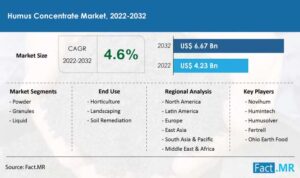Humus Concentrate Market In the realm of agriculture and sustainable farming practices, humus concentrate has emerged as a game-changing ingredient. As the world grapples with the need for eco-friendly and efficient agricultural solutions, humus concentrate offers a holistic approach to soil enrichment and plant vitality. This article delves into the fascinating world of humus concentrate, its benefits, applications, and the impact it’s making in modern agriculture.
For More insights into the, Request a Sample of this Report:
- The Essence of Humus Concentrate
Humus, often referred to as the “life force” of soil, is a complex organic substance formed through the decomposition of plant and animal matter. Humus concentrate is a concentrated form of this organic matter, rich in essential nutrients, beneficial microorganisms, and organic compounds. When added to soil, it works wonders to enhance soil structure, fertility, and overall plant health.
- The Benefits Unveiled
The use of humus concentrate offers an array of benefits for both soil and crops:
Improved Soil Structure: Humus concentrate enhances soil aggregation, promoting better water retention and drainage. This improved structure reduces soil erosion and compaction, leading to healthier and more resilient soil.
Nutrient Enrichment: Packed with nutrients like nitrogen, phosphorus, and potassium, humus concentrate acts as a natural fertilizer, slowly releasing these nutrients over time to nourish plants.
Microbial Activity: Humus concentrate introduces beneficial microorganisms, such as mycorrhizal fungi and bacteria, which support nutrient uptake by plants, improve soil aeration, and suppress harmful pathogens.
pH Regulation: Humus concentrate has a buffering effect on soil pH, helping to maintain optimal pH levels for plant growth and nutrient availability.
- Applications in Modern Agriculture
Humus concentrate finds application in various agricultural practices:
Organic Farming: With its organic and sustainable properties, humus concentrate is a perfect fit for organic farming. It promotes healthy soil ecosystems without relying on synthetic chemicals.
Regenerative Agriculture: Humus concentrate plays a crucial role in regenerative practices by rebuilding soil health and fertility, sequestering carbon, and contributing to long-term sustainability.
Crop Productivity: Its nutrient-rich composition translates to increased crop yields, improved crop quality, and reduced need for synthetic fertilizers.
- Sustainability and Environmental Impact
As the world becomes more conscious of environmental preservation, humus concentrate offers a greener alternative to conventional agricultural practices. Its ability to enhance soil health contributes to carbon sequestration and reduces the need for chemical inputs, ultimately supporting more sustainable and resilient food production.
- Future Outlook and Innovation
The humus concentrate market is poised for significant growth as farmers and researchers recognize its potential. Ongoing research and innovation are likely to unveil new formulations, application methods, and ways to optimize its effectiveness in different soil types and climates.
The humus concentrate market is a shining example of how age-old principles of soil health and organic matter can be harnessed to address modern agricultural challenges. With its profound impact on soil structure, nutrient availability, and plant vitality, humus concentrate is breathing new life into sustainable farming practices. As the world seeks innovative solutions for a more eco-friendly and resilient agricultural future, humus concentrate stands as a beacon of hope and growth.
